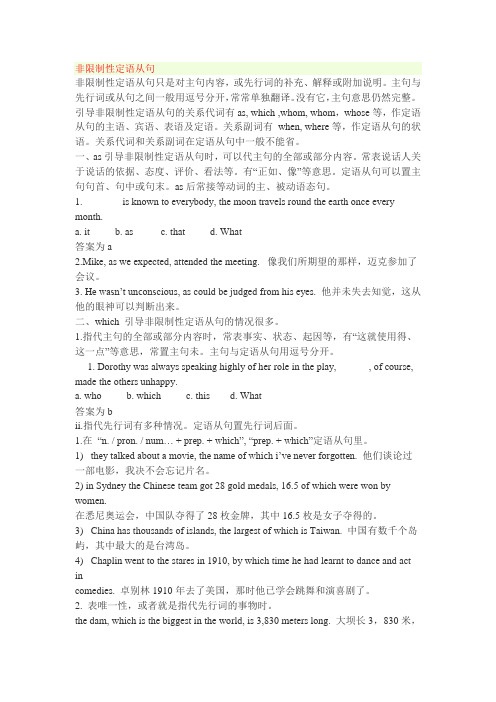非限制性定语从句
非限制性定语从句

非限制性定语从句非限制性定语从句根据定语从句与先行词的关系,定语从句可分为限制性定语从句及非限制性定语从句。
限制性定语从句紧跟先行词,主句与从句不用逗号分开,从句不可省去;非限制性定语从句主句与从句之间有逗号分开,起补充说明作用,如省去,意思仍完整。
以下是店铺整理的非限制性定语从句,欢迎大家借鉴与参考,希望对大家有所帮助。
非限制性定语从句 1非限制性定语从句:即非限定性定语从句,起补充说明作用,缺少也不会影响全句的理解,在非限定性定语从句的前面往往有逗号隔开,如若将非限定性定语从句放在句子中间,其前后都需要用逗号隔开。
由as, which 引导的非限定性定语从句,as和which可代整个主句,相当于and this或and that。
As一般放在句首,which在句中。
使用规则及注意事项:1、which引导的非限定性定语从句是用来说明前面整个句子的情况或主句的某一部分。
2、as有时也可用作关系代词。
as引导非限制性定语从句,若as在从句中作主语,其引导的句子可以放在句首,也可以放在句中。
但which引导的非限制性定语从句只能放句中。
例句:As is reported in the newspaper, some artistic treasures (艺术珍品) will be on show at the exhibition on the weekend.3、在非限定性定语从句中,关系词不能用that。
限制性定语从句和非限制性定语从句有四大区别:1在句中作用不同限制性定语从句对被修饰的先行词有限定制约作用,使该词的含义更具体,更明确。
限制性定语从句不能被省略,否则句意就不完整。
非限制性定语从句与先行词关系不十分密切,只是对其作一些附加说明,不起限定制约作用。
如果将非限制性定语从句省去,主句的意义仍然完整。
2外在表现形式不同限制性定语从句因与先行词关系密切,所以不可以用逗号将其与主句隔开;而非限制性定语从句与先行词关系不十分密切,所以可用逗号将其与主句隔开。
非限制性定语从句的详细解析

非限制性定语从句非限制性定语从句只是对主句内容,或先行词的补充、解释或附加说明。
主句与先行词或从句之间一般用逗号分开,常常单独翻译。
没有它,主句意思仍然完整。
引导非限制性定语从句的关系代词有as, which ,whom, whom,whose等,作定语从句的主语、宾语、表语及定语。
关系副词有when, where等,作定语从句的状语。
关系代词和关系副词在定语从句中一般不能省。
一、as引导非限制性定语从句时,可以代主句的全部或部分内容。
常表说话人关于说话的依据、态度、评价、看法等。
有“正如、像”等意思。
定语从句可以置主句句首、句中或句末。
as后常接等动词的主、被动语态句。
1. _______ is known to everybody, the moon travels round the earth once every month.a. itb. asc. thatd. What答案为a2.Mike, as we expected, attended the meeting. 像我们所期望的那样,迈克参加了会议。
3. H e wasn’t uncons cious, as could be judged from his eyes. 他并未失去知觉,这从他的眼神可以判断出来。
二、which 引导非限制性定语从句的情况很多。
1.指代主句的全部或部分内容时,常表事实、状态、起因等,有“这就使用得、这一点”等意思,常置主句未。
主句与定语从句用逗号分开。
1. Dorothy was always speaking highly of her role in the play, ______, of course, made the others unhappy.a. whob. whichc. thisd. What答案为bii.指代先行词有多种情况。
定语从句置先行词后面。
1.在“n. / pron. / num… + prep. + which”, “prep. + which”定语从句里。
非限制性定语从句

games and songs. 6. He is absorbed in work, ____he often was.
hometown,will open next year. 3. We shouldn’t spent our money testing so many people, most of
_____are healthy 4. Chan’s restaurant on Baker Street, ____used to be poorly run, is now
(2)Xi’an, which we visited last year, is really a beautiful city.
(3) My favorite season is autumn, when we celebrate the Mid-Autumn
Festival.
2. 在限制性定语从句中,作宾语的关系代词可以省略,但在非限制性 定语从句中,作宾语的关系代词不能省略。如:
(1)His father, who is a famous actor, will go to Canada next week.
(2)I was born in Beijing, which is the capital of China. 2. 当先行词被指示代词、形容词或物主代词修饰时,要用非限制性定 语从句。如:
练习: 1. His movies won several awards at the film festival, _____was beyond
非限定性定语从句

非限制性定语从句非限制性定语从句的作用是对所修饰的成分作进一步说明,通常是引导词和先行词之间用逗号隔开,将从句拿掉后其他部分仍可成立1. which引导的非限定性定语从句作用是说明前面整个句子的情况或主句的某一部分2.当先行词是专有名词、物主代词或指示代词所修饰时,其后的定语从句通常是非限制性的,例如:Charles Smith, who was my former teacher, retired last year.查理·史密斯去年退休了,他曾经是我的老师。
My house, which I bought last year, has got a lovely garden.我去年买的的那幢房子带着个漂亮的花园。
This novel, which I have read three times, is very touching.这本小说很动人,我已经读了三遍。
3.非限定性定语从句可将整个主句作为先行词, 对其进行修饰, 这时从句谓语动词要用第三人称单数,例如:He seems not to have grasped what I meant, which greatly upsets me.他似乎没抓住我的意思,这使我心烦。
Liquid water changes to vapor, which is called evaporation. 液态水变为蒸汽,这就叫做蒸发。
4.有时as也可用作关系代词5. 在非限定性定语从句中,不能用关系副词why和关系代词that,而用who, whom代表人,用which,whose代表事物,如果需要用why,可用for which代替.;p.s: which引导的非限制性定语从句其后不可省略成分,as可以关系代词引导的定语从句who指人在从句中做主语(1) The boys who are playing football are from Class One. 在踢足球的男孩们是一班的.(2) Yesterday I helped an old man who lost his way. 昨天,我帮助了一个迷路的老人.whom指人,定语从句中充当宾语,常省略。
什么是非限制性定语从句

什么是非限制性定语从句定语从句有限制性和非限制性两种。
限制性定语从句是先行词不可缺少的部分,去掉它主句意思往往不明确;非限制性定语从句是先行词的附加说明,去掉了也不会影响主句的意思,它与主句之间通常用逗号分开,将非限定性定语从句放在句子中间,其前后都需要用逗号隔开。
非限制性定语从句可以简单理解为就是没有紧跟在修饰对象(即先行词)之后的定语从句,与限制性定语从句刚好相反。
也就是说,先行词和非限制性定语从句之间常被逗号或是其它语句部分隔开,而没有紧密连接在一起。
需要注意的是:1)引导词that(关系代词)和why(关系副词)一般不用于引导非限制性定语从句。
2)引导词which(关系代词)在引导非限制性定语从句时,不仅可以指代主句的某部分内容,还可以用来指代整个主句。
具体示例如下:(下划线部分是非限制性定语从句;加粗字体是该定语从句的修饰对象,也就是先行词。
)例1:I am looking for a watch, which Jason bought me.例2:The puppy peed in his arms, which made us laugh.例3:Penny, who used to be a waitress, becomes a successful saleswoman.例4:Many people witnessed the accident, some of whom called the police.例5:Jacob is the silent boy standing in the back, whose hair is black and straight.例6:He realized the days were all over when they could talk everything to each other.例7:She wandered in the school alone and aimlessly, where they last met.值得注意的是,由于定语从句的本质是形容词,通常只起到修饰作用,所以定语从句本身一般不会对主句的完整性产生任何影响。
非限制性定语从句

非限制性定语从句1. 定义非限制性定语从句(Non-restrictive Relative Clauses)是指用来修饰一个名词或代词,且不对其进行限定的定语从句。
这种从句通常提供一些额外信息,而不是对名词或代词进行修饰、定义或区分。
非限制性定语从句和限制性定语从句的区别在于非限制性定语从句用逗号或破折号将其与主句分隔开来,而限制性定语从句则不用分隔符。
例如:•限制性定语从句:The book that I borrowed last week was very interesting.•非限制性定语从句:My friend, who is a doctor, came to visit me.非限制性定语从句通常用来提供额外的信息,使得整个句子更加丰富和具体。
2. 结构非限制性定语从句的结构相对简单,通常由关系副词(如where, when, why)或关系代词(如who, whom, which)引导,并且使用逗号或破折号将其与主句分隔开来。
以下是一些常见的关系代词和关系副词:•关系代词:who, whom, whose, which, that•关系副词:where, when, why例如:•关系代词引导的非限制性定语从句:My brother, who is a teacher, lives in London.•关系副词引导的非限制性定语从句:I still remember the day, when we went to the beach.3. 示例以下是一些示例,以帮助读者更好地理解非限制性定语从句的用法和作用。
1.This is my father, who is an engineer.2.The house, which was built in the 19th century, is now a museum.3.She loves music, which is why she plays the piano every day.4.The dog, whose tail is wagging, seems very happy.5.Tom finally got the job, which he had been dreaming of.4. 注意事项在使用非限制性定语从句时,需要注意以下几点:•逗号或破折号:非限制性定语从句通常使用逗号或破折号与主句分隔开来,这有助于读者更好地理解句子的结构和意思。
非限制性定语从句

• (3)He is against the idea, as can be expected. • (4)He has to work on Sundays, which he doesn’t like.
• 5)She remarried, as we had expected.
• (6)She remarried, which we unexpected.
• Our teacher, who is getting old,will soon retired.
They cut open the boot of the man, whose leg was broken.
名师伴你行
2.由介词+which和介词+whom等引导非 限制性定语从句:
Here are players from Japan, some of (whom ) are our old friends.
• • • • • •
在非限制性定语从句中 1. 不能用that 2关系代词做宾语时不能省略。 3 whom 在从句中作宾语时不能用who或 that代替。 4 可以修饰整个句子,有逗号隔开,只 能由which或as引导
• 5. 在翻译时,限句常译为定语, 非限句常译为并列句或状语从句。
名师伴你行
名师伴你行
限制性定语从句是先行词不可缺少的 定语,而非限制性定语从句只是附加 说明,如果去掉,主句意思仍然清楚。 非限制性定语从句用逗号与主句隔开。
1.由which, who, whom, whose, where, when等引导:
•
Football, which is a very interesting game, is played all over the world.
非限制性定语从句

• Her brother, who is now a soldier, always encourages her to go to college. • 她哥哥是当兵的,他总是鼓励她上大学。 • (意含: 她只有一个哥哥。)
• . All the books that have pictures in them are well written.
C • 例4 I had told them the reason ______ I didn’t attend the meeting. •
• •
A. when C. why
B. which D. for that
• 解析: 例3意为:“我早已把理由告诉他们, 于是我没有出席会议。”先行词为reason 时,非限制性定语从句应用for which引导, 故选A。
C • 5.Write a letter to a friend,____has some difficulties with his studies. M • 6.There are four rooms in the house,____ is a drawing room. H • 7.We will move into the new house next week,____it will be completed. A • 8.When lost in work,he often was,____he would forget all about eating and sleeping.
所有里面带插图的书都写得很好。 (意含: 不带插图的书则不一定写得好。)
• All the books, which have pictures in them, are well written.
- 1、下载文档前请自行甄别文档内容的完整性,平台不提供额外的编辑、内容补充、找答案等附加服务。
- 2、"仅部分预览"的文档,不可在线预览部分如存在完整性等问题,可反馈申请退款(可完整预览的文档不适用该条件!)。
- 3、如文档侵犯您的权益,请联系客服反馈,我们会尽快为您处理(人工客服工作时间:9:00-18:30)。
非限制性定语从句非限定性定语从句:非限定性定语从句的作用是对所修饰的成分作进一步说明,通常和主句间用逗号隔开,将从句拿掉后其他部分仍可成立1. which引导的非限定性定语从句来说明前面整个句子的情况或主句的某一部分,that不能用于引导非限制性定语从句例如:Her house,which was built a hundred years ago,stood still in the earthquake.(那座房子在地震中依然耸立,它是一百多年前建造的。
)3. 有时as也可用作关系代词4. 在非限定性定语从句中,用who, whom代表人,用which代表事物.5.当先行词是专有名词或物主代词和指示代词所修饰时,其后的定语从句通常是非限制性的。
例如:Charles Smith, who was my former teacher, retired last year. 查理·史密斯去年退休了,他曾经是我的老师。
My house, which I bought last year, has got a lovely garden. 我去年买的的那幢房子带着个漂亮的花园。
This novel, which I have read three times, is very touching. 这本小说很动人,我已经读了三遍。
6.非限制性定语从句还能将整个主句作为先行词, 对其进行修饰, 这时从句谓语动词要用第三人称单数,例如:He seems not to have grasped what I meant, which greatly upsets me. 他似乎没抓住我的意思,这使我心烦。
Liquid water changes to vapor, which is called evaporation. 液态水变为蒸汽,这就叫做蒸发。
非限制性定语从句只是对主句内容,或先行词的补充、解释或附加说明。
主句与先行词或从句之间一般用逗号分开,常常单独翻译。
没有它,主句意思仍然完整。
引导非限制性定语从句的关系代词有as,which,who,whom,whose等,作定语从句的主语、宾语、表语及定语。
关系副词有when,where等,作定语从句的状语。
关系代词和关系副词在定语从句中一般不能省。
一、as引导非限制性定语从句时,可以代主句的全部或部分内容。
常表说话人关于说话的依据、态度、评论、看法等。
有“正如、像”等意思。
定语从句可以置主句句首、句中或句末。
as后常接expect,know,report,say,see等动词的主、被动语态句。
1.____is known to everybody,the moon travels round the earth once every month.A.It B.As C.That D.What2.Mike,as we expected,attended the meeting.像我们所期望的那样,迈克参加了会议。
3.He wasn't unconsicious,as could be judged from his eyes.他并未失去知觉,这从他的眼神可以判断出来。
二、which引导非限制性定语从句的情况很多。
I.指代主句的全部或部分内容时,常表事实、状态、起因等,有“这就使得、这一点”等意思,常置主句末。
主句与定语从句用逗号分开。
1.Dorathy was always speaking highly of her role in the play,,of course,madethe others unhappy.A.who B.which C.this D.whatII.指代先行词有多种情况。
定语从句置先行词后面。
1.在“n./pron./num....+prep.+which”,“prep.+which”定语从句里。
1)They talked about a movie,the name of which I've never forgotten.他们谈论过一部电影,我决不会忘记片名。
2)In Sydney the Chinese team got 28 gold medals,16.5 of which were won by women.在悉尼奥运会,中国队夺得了28枚金牌,其中16.5枚是女子夺得的。
3)China has thousands of islands,the largest of which is Taiwan.中国有数千个岛屿,其中最大的是台湾岛。
第2/6页4)Chaplin went to the states in 1910,by which time he had learnt to dance and act in comedies.卓别林1910年去了美国,那时他已学会跳舞和演喜剧了。
2.表唯一性,或者就是指代先行词的事物时。
The dam,which is the biggest in the world,is 3,830 metres long.大坝长3,830米,是世界上最大的坝。
3.先行词是独一无二的事物时。
The moon,which doesn't give out light itself,is only a satellite of the earth.月球本身不发光,它只是地球的一个卫星。
4.先行词表示类属的事物时。
Football,which is a very interesting game,is played all over the world.足球是一项非常有趣的运动,全世界都踢足球。
5.先行词是专有名词时。
1)Three of the biggest man-made projects in the world are the Great Wall of China,the Pyramids of Egypt and the Aswan High Dam,which isalso in Egypt.世界上最大的三项人造工程是中国的长城,埃及的金字塔和阿斯旺高坝,它也在埃及。
2)The Nile,which used to flood every year,now runs more regularly below the dam.尼罗河年年涨洪水,现在比较正常地在大坝下面流过了。
6.先行词是表人的职业、品质、身份等名词,作定语从句的表语时。
主句和定语从句之间含有对比的意思。
Mike's brother is a policeman,which he isn't.迈克的哥哥是警察,他可不是。
7.先行词是形容词作定语从句的表语时。
主句和定语从句含有对比的意思。
Li Ling is very clever,which Li Long isn't.李玲很聪明,李珑可不是。
8.先行词是集体名词表整体意思时。
My family,which has 35 ,is a large .我家有35口人,是一个大家庭。
9.先行词是国家名词表地域概念时。
第3/6页Last year he went to Egypt,which is in Africa.他去年去了埃及,埃及在非洲。
三、as,which是指代主句内容的非限制性定语从句时,表依据、评论与表事实、状态等没有多大差别,又在主句末时,有时可以通用。
1.He is quite pleased,as /which can be seen from his face.他非常高兴,从他的表情可以看出来。
2.You always work hard,as /which everyone knows.大家都知道,你一向勤奋学习。
但是,上面两句把定语从句置主句句首时,就只能用as。
3.This elephant is like a snake,as anybody can see.像任何人都能看见那样,这头象像条蛇。
4.Bamboo is hollow,which makes it very light.竹子是空的,这就使得它很轻。
在否定意义的非限制性定语从句里,一般用which引导。
5.He came to my birthday party,which I didn't expect at all.我完全没有想到,他来参加我的生日聚会了。
四、who,whom,whose等引导非限制性定语从句时,指代人的普通名词、专有名词等。
表示正是或专指先行词等情况。
在定语从句中作主语、宾语、定语等。
1.Bob's father,who worked on the project,spent four years in Egypt.鲍勃的父亲从事这项工程,在埃及度过了四年。
2.Dad,this is Zheng Jie,who I knew in Paris.爸,这是郑杰,我在巴黎认识的。
这一句是用主格who代替宾格whom。
3.His mother,whom he loved dearly,died in 1818.他非常爱戴他的母亲,她死于1818年。
4.Mr King,whose legs were badly hurt,was quickly taken to hospital.金先生的腿受了重伤,他很快就被送去住院了。
n./pron./num....prep.whom;prep.whom;in whose +n.;the +n.of whom等引导非限制性的定语从句5.He spoke of a pen-pal,the name of whom /whose name I've never forgotten.他提到过一个笔友,他的名字我从未忘记。
6.About 2,000people,many of whom were Europeans,worked on the project.大约两千人从事过这项工程,其中很多是欧洲人。
7.In his office there are nine clerks,the youngest of whom is Mr Liu.他办公室有9个职员,其中最年轻的是刘先生。
8.I decided to write about Chaplin,one of whose films I had seen several years before.我决定写有关卓别林的代章,他的一部电影我几年前就看过了。
9.We went to hear this famous singer,about whom we had heard many stories.我们去听这个著名的歌唱家演唱。
